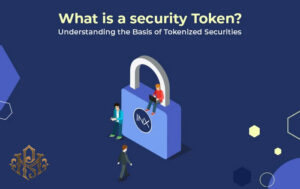
Close



What is a security token? In the dynamic landscape of blockchain technology and digital currencies, security tokens have emerged as a transformative innovation, offering a new paradigm for asset ownership, investment and fundraising. Unlike traditional digital currencies such as Bitcoin or Ethereum, which function primarily as a medium of exchange or store of value, security tokens represent ownership interests in real-world assets, such as stocks, bonds, real estate, or commodities. . In this article, we begin a comprehensive exploration of security tokens and explore their concept, characteristics, regulatory framework, and potential implications for the financial industry.
At its core, a security token is a digital representation of ownership or investment in a real-world asset powered by blockchain technology. Security tokens are typically issued and traded on blockchain platforms and use smart contracts to automate processes such as issuance, transfer, and compliance. Unlike utility tokens, which grant access to a product or service in the blockchain ecosystem, security tokens derive their value from external assets or income streams, making them subject to securities regulation.
Asset-backed: Security tokens are backed by tangible assets or income-generating activities, giving investors a claim to ownership or rights to income. These assets can range from traditional financial instruments such as stocks and bonds to alternative investments such as real estate, venture capital or fine art.
Regulatory Compliance: Due to their nature as investment contracts, security tokens are subject to securities regulations imposed by regulatory authorities such as the Securities and Exchange Commission (SEC) in the US or the Financial Conduct Authority (FCA) in the UK. . Issuers of security tokens must adhere to regulatory requirements related to disclosure, investor protection and compliance with securities laws.
Fractional ownership: Security tokens enable fractional ownership of assets, allowing investors to purchase and trade fractional units of high-value assets. This diversification opens up investment opportunities to a wider range of investors and democratizes access to traditionally illiquid or inaccessible assets.
Programmability: Security tokens use smart contracts to encode the terms and conditions of ownership and enable automatic execution of contractual agreements and compliance protocols. Smart contracts facilitate real-time settlement, dividend distribution, voting rights, and other governance functions, increasing efficiency and transparency in asset management.

Equity Tokens: Equity tokens represent ownership stakes in a company that entitle holders to dividends, voting rights, and capital gains. Equity tokens can be issued by startups, private companies, or public companies, offering investors an alternative to traditional equity ownership through stock or equity certificates.
Debt tokens: Debt tokens represent debt instruments such as bonds, loans or promissory notes that provide fixed income streams or interest payments to investors. Debt tokens may offer advantages such as automatic interest payments, fractional ownership and increased liquidity compared to traditional debt securities.
Real estate tokens: Real estate tokens represent fractional ownership of real estate assets such as residential properties, commercial buildings or development projects. Real estate tokens allow investors to diversify their portfolios, gain access to high-value real estate, and participate in rental income or property appreciation.
Asset-Backed Tokens: Asset-backed tokens represent ownership of physical assets such as precious metals, commodities, or collectibles. Leveraging the benefits of blockchain technology, such as transparency, divisibility and portability, these tokens give investors exposure to tangible assets.
The legal treatment of security tokens varies across jurisdictions, with regulators taking diverse approaches to address the unique challenges and opportunities presented by tokenized securities. For example, in the United States, the SEC has taken a proactive stance on the regulation of securities tokens, emphasizing investor protection, disclosure requirements, and compliance with securities laws. Issuers of security tokens must comply with regulatory frameworks such as the Securities Act of 1933 and the Securities Exchange Act of 1934 that govern the issuance, trading and transfer of securities.
In Europe, the regulatory landscape for security tokens is changing under the Markets in Financial Instruments Directive (MiFID II) and bookkeeping regulations. Emphasizing the importance of investor protection, market integrity and transparency, the European Securities and Markets Authority (ESMA) has issued guidance on the application of securities regulations to tokenized assets.
In another episode on Pooyan Music, we will cover the pros and cons of Security token. Stay Tuned!